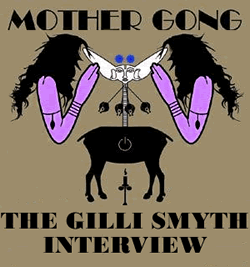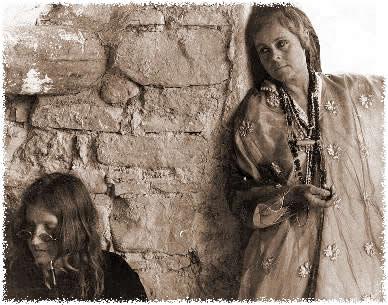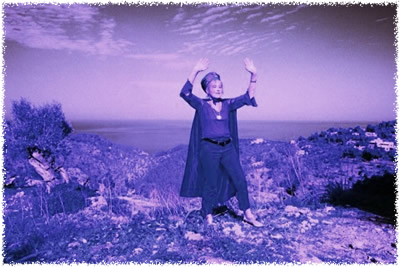|
In 1994
Smyth put poetry and music aside long enough to write an
historical essay that resulted in a book, 'Gong;
Politico Historico Spirito'. Even if at the end of her book
she bursts into a performance rhyme titled "We Who Were
Raging in the late 60s and early 70s", the effect goes far
beyond that of a rant. Instead of rehashed nostalgia Smyth
details the inspirations and effects of Gong's modus
operandi, carefully reflecting on the events and
alternative realities of those times. Her essential story of
Gong's journey is bound to please those who rode or are
continuing to ride similar spiritual, artistic and political
seas.
In the
following interview, like in her writing and music, Smyth
does not strain to be hip. Instead she spins the ongoing
unique threads of a sincere and thoughtful quest. Through
all the 20th and current century's tumult, she chronicles
the survival, hope and enchantments of Gong's ongoing
poetry, psychedelia and jazz.
Darrell Jónsson: In your book 'Politico, Historico,
Spirito' you quote Daevid Allen as saying "For me Gong is
not something from a past time. Gong was originally created
as a vehicle for new ideas, ideas which were ahead of the
time. I think it can be seen Gong brought through ideas that
were not mainstreamed until five, even fifteen years later".
Where do you see some of those ideas of Gong reflected in
current music & culture?
Gilli Smyth: For me the interesting aspect of this is
political. There was a kind of opening in the sky in 1968
with the revolution in France, echoed by protests against
Vietnam in U.S., civil rights, etc. And now after a couple
of decades of excessive consumerism people are turning back
to ideas of sharing, of non-consumerism for the sake of the
planet, the belief that music, poetry, art, is far more
fulfilling, not just for the skilled but for everybody. That
is really "the great sharing". We lived in communes this is
the communal mind. In fact I am working on Part 2 of "Historico
Politico" which will be the history of the Uncon in
Amsterdam [Gong's 2006 'Unconventional Gathering' - Ed.]
and how it relates back to counter culture ideas in the 60's
and 70's. The wheel turns, the world is always changing, and
there will be changes far beyond what we could have
imagined.
DJ: How many of these ideas came from your exposure to
and friendship with non-rock musician artists like Don
Cherry and Julian Beck?
GS: Don Cherry in particular was a very dedicated person and
spent his later years playing music in schools instead of
being a superstar. He played with us in the first Gong in
1968 and at the Museum of Modern art in Stockholm where he
lived. I forgot my purple robe there and after all the
escape from Paris when we were hunted as "revolutionaries"
and then on return, I was astonished to meet him one evening
in San Michel carrying the robe to the gig there. That was
the kind of magical thing he did, and his flute was so pure
and magical, like Pan in the woods. I don't remember
exchanging ideas so much with him as exchanging music. In
that first Gong of 1968 I was singing with Ziska and
together we devised the sound which is now called "space
whisper", and it was here that playing with Don Cherry
reached its height. Then she had to leave Paris too, and
that Gong broke up.
DJ: Like Sun Ra, Magma, La
Monte Young and other 20th century musical artists, Gong
seems to have been involved with creating a functional mytho-poetic
world or even cosmology to form the basis of much of their
work. What inspired Gong to take their art to such
cosmological proportions?
GS: People have probably forgotten what huge changes in
culture were happening, especially with the threat of
nuclear mayhem, and that musicians like us were in permanent
danger from the "conservative" establishment and
institutions. The idea of different worlds came naturally,
but gives an artist a huge and wonderful palette. The best
remedy for a conservative establishment is absurdity and
far-reaching imaginations.
DJ: Talking with you in the past and reading your book,
there is the impression that you and members of the band as
much as having a flood of ideas were very much engaged with
a proactive 'creativity ethic'. How did the visions and
rigors of creativity shape your daily lives?
GS: When we all lived together in a big house in the forest
(about 15 people) the rhythm of life was geared to playing
daily and whenever possible in this strange big room called
"the hunting room" hung with boar's heads. Vegetarians all,
we shuddered and hung things over them...but there was a
constant stream of creativity day and night, frequently the
band left on gigs but there were always other people in the
house and the forest.
DJ: How do you see the future of Gong's extended
community continuing in the present and in the near future?
GS: I have no idea. All I can say is that the November Uncon
in Amsterdam was the most tremendous experience. 1200 or
more people coming together, sharing deeply, uplifted by
music. One hopes there will be more of that, but what an
effort it was for Jonny at GAS to put it on!
DJ: How has Mother Gong's and your other projects
approach evolved differently from Gong over the years?
GS: I see the initial Gong band and philosophy as Yin Yan.
Then in 1974 I left the band, desiring a simpler pathway
based on the feminine nature of creation, although I have
always been against the great gender divide, as basically
one step up from the physical level, to the intellectual or
spiritual level, where there is no gender difference between
male and female, we all have the full complement of human
experience, human emotions, human fears and longings.
DJ: Did the November 2006 "Gong Unconvention" at
Amsterdam's Melkweg mark a new era or threshold for Gong's
many interrelated activies?
GS: Will the musicians in Gong work fully anyway, in music,
in all different ways, and we found a great joy in playing
together like that, so we hope it happens more, but the way
the world is you never have any idea what is going to
happen.
DJ: What current and future projects, do you or Mother
Gong have, that Terrascope readers will find of interest?
GS: Our projects include the upcoming release of the Mother
Gong set from Uncon (shortly with Voiceprint) and I am also
writing a political book on the kind of questions you are
asking me here.
DJ: Has the role of the
feminine changed in music in the decades since you began
working with music? If so where do you see and hear feminine
aspects expressed differently than may have been in the
1950s and 60s?
GS: You know the world has changed so dramatically in
relation to women since...when you look at old movies for
example you wonder how women could ever have stood the
constant belittling, discrediting, being prevented from
taking a full part in society...from ever becoming Prime
Minister, or air line pilots, or head of the Defence Force
(not to fight, but to negotiate).
DJ: The influence of the
Hippies and Beatniks is well documented by this time, yet it
seems much of what happened in Post WWII European diasporas
had resonance's with movements and concepts that were
evolving early in the 20th century and before. Are there any
17th, 18th, 19th or early 20th literary or musical
influences that pre-dated any concepts or ideas that you
found being validated in the 60s?
GS: It's true, there have been tremendous social
movements.... from the French Revolution to the Peasants
Revolt, the early feminist movement with the meeting at
Seneca Falls, the Diggers and Levellers.... hippies are just
one more in the long line of people , idealists...trying to
effect social change for the better, usually under very
authoritarian right wing governments that repressed all the
people who did not fit into the "Party line", who wanted
equality, as well as freedom and brotherhood (and
sisterhood). There are so many misconceptions about hippies,
like sex, drugs, and rock and roll. Those were really not
important but part of the search for freedom. and it was
political freedom that was the motor of the movement,
freedom to live in peaceful ways and not join the army,
freedom from materialist concerns fabricated by the
manufacturers. And for which people had to have "a day job",
any job, instead of learning to live on very little, and
just living.
Interview and introdution by by Darrell Jónsson.
Editor: Phil McMullen © Terrascope
Online, 2007
Artwork for heading: by
Phil McMullen, after the Voiceprint Records CD cover 'Mother
Gong 2006'
Photo of Daevid Allen and
Gilli Smyth from the movie 'Le Tarot' (Jackie Wester)
sourced at Gilli Smyth
Website
Photo of Gilli at Deya by
Jeremy Dunn, sourced at
Gilli Smyth Website
Link to
Gong website
Link to
Voiceprint
Records website |


